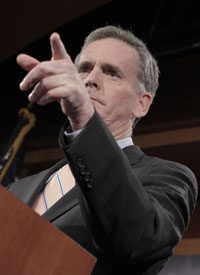
The announcement came just nine days after the president and Gregg appeared together at a press conference to announce the nomination and, in an unusual political concession, New Hampshire’s Democratic governor appointed a Republican to succeed Gregg in the Senate. That agreement was reached after Gregg insisted he would not accept the Commerce appointment if it would reduce the number of Senate Republicans.
But it all came to naught yesterday when Gregg said that as issues crystallized and came more clearly into focus, he realized he would not be “a good fit” in an Obama administration. “The bottom line is this was simply a bridge too far for me,” the three-term senator said at a Washington press conference
A little more than an hour earlier Gregg, in a written statement, had cited unspecified “irresolvable conflicts” over the economic stimulus bill and issues surrounding the 2010 census as reasons for his withdrawal. Since the Gregg nomination was announced, reports surfaced that administration officials planned to take control of the Census Bureau and direct its operations from the White House rather than the Commerce Department, prompting Republican outcries against a politicization of the census. The constitutionally mandated head count every tenth year has significant political implications for redistricting congressional districts and for allocating money, based on population, for federal projects and programs. Obama had come under fire from some constituent groups for choosing Gregg, since the senator had voted against increased funding for the census in the past and once voted in favor of a nonbinding Republican budget resolution that called for elimination of the Commerce Department.
“Prior to accepting this post, we had discussed these and other potential differences, but unfortunately we did not adequately focus on these concerns. We are functioning from a different set of views on many critical items of policy,” the Gregg statement said. Yet at his press conference, the senator played down the census concern, saying it was “only a slight issue” in his decision.
“I’m a fiscal conservative, as everybody knows, a fairly strong one,” he said. “I just realized as the issues started coming at us and crystallizing that I just wouldn’t be a good fit.” That hardly explains how a veteran U.S. senator, proud of his reputation as a “fiscal conservative,” could have been unaware of his policy differences with Obama, whom Republicans told us repeatedly last year had the most liberal voting record of any U.S. senator. Only a few weeks ago, before he was nominated for the Commerce post, Gregg had high praise for Obama and spoke of his own lead role among Senate Republicans in gaining approval for the administration’s request for authorization to spend $350 billion on the Troubled Assets Relief Program for failing financial institutions.
And while Gregg said at that time that he would try to make some changes in the president’s economic stimulus bill, he expected to vote for the $800 billion spending plan that appeared to fit the description of the “Obama Spendorama” that Gregg warned about when he was campaigning last year for John McCain. He later said that he looked forward to promoting the stimulus package as Commerce secretary. Since his nomination, Gregg has abstained from votes on the stimulus bill. Asked yesterday how he would have voted, Gregg suggested “we wait and see” how he votes on on the final version of the bill.
The New Hampshire senator would have been the third Republican in the cabinet of the Democratic president, joining Defense Secretary Robert Gates, who held that position for the last two years of the Bush administration, and Secretary of Transportation Ray LaHood. Gregg said he respected Obama’s outreach to Republicans. “The president asked me to do it and I said ‘Yes’ and that was a mistake on my part,” he said.
White House spokesman Robert Gibbs yesterday issued a statement about the withdrawal that was somewhat at odds with the Gregg version. For one thing, it suggested Gregg had approached the president about the job, not the other way around. “Senator Gregg reached out to the president and offered his name for Secretary of Commerce,” Gibbs said. And far from being inadequately focused on the policy differences, the White House official said, Gregg “was very clear throughout the interviewing process that despite past disagreement about policies, he would support, embrace and move forward with the President’s agenda.”
But why would a “fiscal conservative” want to “support, embrace and move forward” the agenda of a president promoting the largest spending program in the nation’s history? Even after withdrawing from the Commerce appointment and announcing his intention to finish out his term in the Senate, Gregg was looking forward to assisting Obama in advancing his agenda. “I do believe genuinely that I can be more effective for his presidency in the senate than even in his cabinet,” Gregg said.
Gregg was Obama’s second choice for the Commerce job and the third cabinet nominee to drop out. New Mexico Governor Bill Richardson withdrew from consideration as Commerce secretary because of a grand jury investigation into allegations of political favoritism in the granting of government contracts. Former Senate Democratic Leader Tom Daschle of South Dakota, Obama’s designee for secretary of Health and Human Services, withdrew because of unpaid taxes. Obama’s choice for chief performance officer, a non-cabinet position, withdrew over unpaid payroll taxes for a household employee.
In a conference call with reporters in New Hampshire yesterday after announcing his withdrawal, Gregg said he would not run for a fourth Senate term in 2010. At his Washington press conference, that became “Probably not.” “I don’t plan to run to run for reelection,” he said still later in an interview with WMUR-TV in Manchester.
A former governor and son of a governor, Gregg is a member of the state’s most prominent political family. In a political career that spans three decades, the 61-year-old is undefeated in either a primary or general election, having won contests for Governor’s Council, the U.S. House, governor and U.S. Senate. In his last two elections, Democrats made no serious effort to unseat him. In 2004, his opponent was a 94-year-old woman, Doris Haddock, the “Granny D” who had gained notoriety a few years earlier for having walked across the country in a crusade for campaign finance reform.
But after winning both House seats in 2006 and the state’s other Senate seat last year, New Hampshire Democrats are ready to take the one Republican seat left in the state’s congressional delegation. Paul Hodes, the U.S. Representative from the Second District, has already announced his candidacy for the Senate seat and Rep. Carol Shea-Porter of the First District is said to be eyeing the seat as well. On the Republican side, John Sununu, who lost his Senate seat to former Gov. Jeanne Shaheen last year, has been mentioned as a potential candidate if Gregg does not run.
Photo: AP Images



